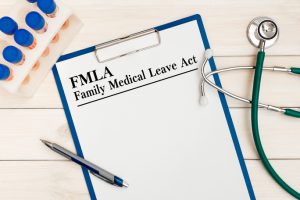
Having to deal with health issues is one of life’s most stressful events. Not far behind is having to deal with a major change for the worse in the health of a close family member. Although most employers offer workers some kind of sick leave policy, the same cannot be said for a policy that grants workers time off to care for a loved one.
Enter the Family and Medical Leave Act (FMLA).
Enacted by the United States Congress in 1993 in response to growing calls for healthcare reform, the FMLA helps workers find a balance between maintaining a vibrant career and tending to the healthcare needs of close family members.
Overview of the FMLA
The FMLA grants American workers up to 12 weeks of leave during 12 consecutive months. However, the leave is not compensated, which can force many workers to make the difficult choice between caring for a family member and losing income, and remaining on the job to receive compensation.
You can take leave under specific circumstances and not every employer has to follow the standards established by the FLMA. Your employer might want proof that you or a loved one has a serious enough medical condition to warrant granting unpaid leave. When a worker returns after an unpaid leave, the employer must offer the worker a job, although it does not have to be the same job the worker had before the unpaid leave.
The Catch with Unpaid Leave
Despite the clause in the FMLA that does not provide for paid leave, you still might be able to get paid while you take care of yourself or a relative. If you have accumulated paid time off from your employer, such as sick days and vacation days, your employer might grant you paid leave to take care of the medical issues covered under the FLMA. Nonetheless, the FLMA and other employment laws do not make it a requirement for employers to grant paid leave to employees that have accumulated sick days and vacation days.
Specific Circumstances for FMLA Coverage
When you want to take unpaid leave under the FMLA, you have to meet a specific circumstance. First, you can take unpaid leave to take care of a serious medical condition that you face or a loved one faces. Second, the FLMA grants military personnel unpaid leave during certain deployments. Finally, the FMLA kicks in for the birth of a child, as well as to place a child up for adoption or in foster care.
Employer Criteria for FLMA Coverage
Not every employer and employee is covered by the FLMA. Only employers that have a minimum of 50 workers on the payroll for at least 20 consecutive weeks during the current or previous year must comply with the FLMA. Smaller employers and independent contractors that have fewer than 50 workers on the payroll are not legally liable to follow the FLMA guidelines. Employees have to demonstrate employment for the same employer for at least one year, with an accumulation of at least 1,250 hours. For an employee who works eight-hour days, the 1,250 hours equals about 156 days of work for the same employer.
To learn more about the FLMA and how it impacts your time away from work to take care of yourself or a family member, contact the team of employment law attorneys at PLBH Law Firm. You can submit the Contact form or call us at (800) 435-7542.
